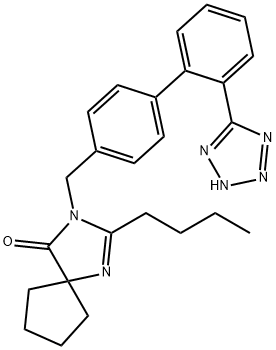Angiotensin II receptor blockers (ARBs) act as cardioprotective agents that are effective in hypertension, left ventricular hypertrophy, postmyocardial infarction, and heart failure. Irbesartan is an ARB with a high affinity for the AT1 receptor (Ki = 2.7 nM) and exceptionally high bioavailability (60-80%). It is an insurmountable antagonist of AT1, as its antagonism of this receptor cannot be overcome by increasing concentrations of angiotensin II. Irbesartan effectively reduces blood pressure alone but may also be used in combination with a diuretic, such as hydrochlorothiazide. As angiotensin II contributes in diverse ways to endothelial dysfunction, irbesartan and other ARBs directly protect the vascular endothelium. Other pathologies, including diabetes and kidney disease, also benefit from the cardiovascular and endothelial protective actions of ARBs like irbesartan.

